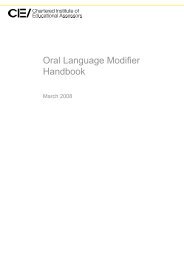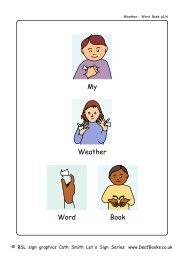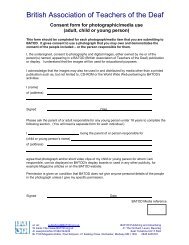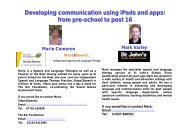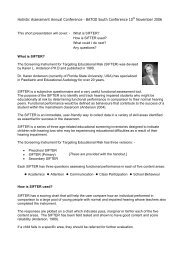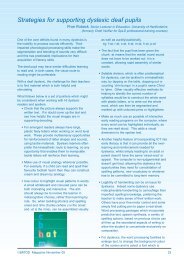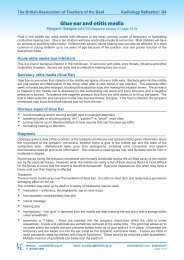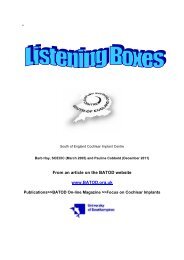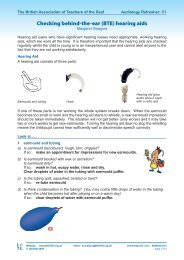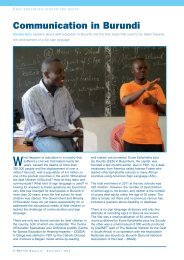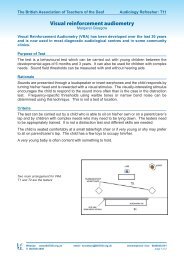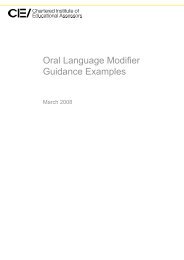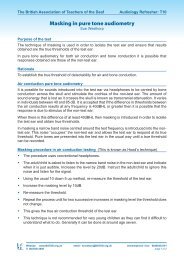Goal fulfilment in school for the deaf and hearing impaired - batod
Goal fulfilment in school for the deaf and hearing impaired - batod
Goal fulfilment in school for the deaf and hearing impaired - batod
- No tags were found...
Create successful ePaper yourself
Turn your PDF publications into a flip-book with our unique Google optimized e-Paper software.
Application of exception from goalswhile grad<strong>in</strong>g, due to disabilityThe compulsory <strong>school</strong> <strong>and</strong> special <strong>school</strong>ord<strong>in</strong>ance gives teachers who award grades <strong>the</strong>possibility of disregard<strong>in</strong>g certa<strong>in</strong> subject goalsif <strong>the</strong> pupil has a disability. Special <strong>school</strong>s, with<strong>the</strong>ir bil<strong>in</strong>gual situation, are a compensatoryenvironment – <strong>the</strong> <strong>school</strong> has to compensate<strong>for</strong> <strong>the</strong> pupils’ hear<strong>in</strong>g loss <strong>and</strong> <strong>deaf</strong>ness. It is<strong>the</strong>re<strong>for</strong>e not odd at all that <strong>the</strong> proportionof teachers who <strong>in</strong>voke <strong>the</strong> right to disregardgoals on account of disability is lower with<strong>in</strong>special <strong>school</strong>s than <strong>school</strong>s <strong>for</strong> <strong>the</strong> hear<strong>in</strong>g<strong>impaired</strong>. But this situation possibly also reflectsthat, at <strong>school</strong>s <strong>for</strong> <strong>the</strong> hear<strong>in</strong>g <strong>impaired</strong>, <strong>the</strong>recan be pupils who are <strong>in</strong> need of <strong>the</strong> adaptedenvironment that exists at special <strong>school</strong>. Forthat reason, <strong>the</strong> Agency would like here tocounsel caution <strong>in</strong> <strong>in</strong>terpret<strong>in</strong>g what <strong>the</strong> provendifference actually means. Are disabilitiesperceived <strong>in</strong> <strong>the</strong> same way <strong>in</strong> <strong>the</strong> different typesof <strong>school</strong>s? Or are <strong>the</strong> goals <strong>in</strong> <strong>the</strong> syllabusesvalued differently? The possibility to disregardgoals when grad<strong>in</strong>g can be a contributoryexplanation to <strong>the</strong> differences that have beenfound.The National Agency <strong>for</strong> Special Schools <strong>for</strong> <strong>the</strong>Deaf <strong>and</strong> Hard of Hear<strong>in</strong>g does not concludewhe<strong>the</strong>r <strong>the</strong> above really is a contributoryexplanation but declares that a difference existsbetween <strong>the</strong> types of <strong>school</strong>s <strong>and</strong> that this oughtto be given attention.Pupils who change type of <strong>school</strong>In this evaluation project, parents have describedhow pupils change type of <strong>school</strong> <strong>and</strong> activitydur<strong>in</strong>g <strong>the</strong>ir <strong>school</strong> years. The assessment hasshown that 10% of <strong>the</strong> pupils repeat a <strong>school</strong>year. Accord<strong>in</strong>g to <strong>the</strong> parents, about 30 pupilshave changed from <strong>in</strong>dividual placement tospecial <strong>school</strong>. As many aga<strong>in</strong> have changedto <strong>and</strong> from <strong>school</strong>s <strong>for</strong> <strong>the</strong> hear<strong>in</strong>g <strong>impaired</strong>.These pupils have probably changed because<strong>the</strong>y see <strong>the</strong>ir possibilities as be<strong>in</strong>g greater <strong>in</strong>ano<strong>the</strong>r <strong>school</strong> than <strong>in</strong> <strong>the</strong> one <strong>the</strong>y attend.The National Agency <strong>for</strong> Special Schools <strong>for</strong><strong>the</strong> Deaf <strong>and</strong> Hard of Hear<strong>in</strong>g considers thatchoice is positive. What is often <strong>for</strong>gotten isthat pupils who change have probably been,from a hear<strong>in</strong>g <strong>and</strong> communicative angle, <strong>in</strong>an environment that is not <strong>the</strong> most favourable<strong>for</strong> <strong>the</strong>m. The changes do not only take placeon <strong>the</strong> basis of educational factors but also onfactors that are audiological <strong>and</strong> communicative.For <strong>the</strong> receiv<strong>in</strong>g <strong>school</strong>, this often <strong>in</strong>volves aparticularly challeng<strong>in</strong>g pedagogic situation. Themotivation <strong>for</strong> <strong>school</strong> work is affected negativelyif <strong>the</strong> changes take place on account of <strong>the</strong>situation not hav<strong>in</strong>g worked <strong>in</strong> <strong>the</strong> previousenvironment. The pupil may have been <strong>in</strong> an<strong>in</strong>correct environment <strong>for</strong> much too long. TheNational Agency <strong>for</strong> Special Schools <strong>for</strong> <strong>the</strong> Deaf<strong>and</strong> Hard of Hear<strong>in</strong>g considers that this may bean explanation <strong>for</strong> some of <strong>the</strong> low grades <strong>in</strong> thisevaluation project. The Agency also th<strong>in</strong>ks thatthis can be an explanation <strong>for</strong> <strong>the</strong> low gradesthat occur <strong>in</strong> all types of <strong>school</strong> – <strong>the</strong> pupilsare <strong>in</strong> subst<strong>and</strong>ard environments <strong>for</strong> too long,where <strong>the</strong> need <strong>for</strong> social ef<strong>for</strong>t is great, <strong>and</strong>this affects <strong>the</strong>ir knowledge level. The NationalAgency <strong>for</strong> Special Schools <strong>for</strong> <strong>the</strong> Deaf <strong>and</strong>Hard of Hear<strong>in</strong>g concludes that, when <strong>the</strong>reis an <strong>in</strong>crease <strong>in</strong> <strong>the</strong> proportion of pupils whochange type of <strong>school</strong> <strong>in</strong> <strong>the</strong> older age groupsbecause <strong>the</strong> previous environment did not work,<strong>the</strong> proportion of pupils with lower grades also<strong>in</strong>creases.Conditions <strong>for</strong> teach<strong>in</strong>gThis project shows that <strong>the</strong>re is a widedistribution as regards merit rat<strong>in</strong>gs with<strong>in</strong> <strong>the</strong>hear<strong>in</strong>g <strong>impaired</strong> <strong>and</strong> <strong>deaf</strong> pupil groups. Tuitionof <strong>deaf</strong> pupils is usually described as more timeconsum<strong>in</strong>gas visual <strong>for</strong>ms of communicationare used to a great extent (Foisack 2003). Quitesimply, it takes longer to teach <strong>the</strong> same amountof knowledge <strong>in</strong> two languages than <strong>in</strong> one.Teach<strong>in</strong>g <strong>in</strong> a small group, where <strong>the</strong> pupils’needs <strong>and</strong> levels vary greatly, is also timeconsum<strong>in</strong>g,irrespective of <strong>the</strong> type of <strong>school</strong>. Itis common <strong>in</strong> special <strong>school</strong>s that <strong>the</strong> teach<strong>in</strong>ggroups <strong>in</strong>clude several pupils with difficulties at<strong>school</strong> additional to hear<strong>in</strong>g loss <strong>and</strong> <strong>deaf</strong>ness.<strong>Goal</strong> <strong>fulfilment</strong> <strong>in</strong> <strong>school</strong> <strong>for</strong> <strong>the</strong> <strong>deaf</strong> <strong>and</strong> hear<strong>in</strong>g <strong>impaired</strong>57



